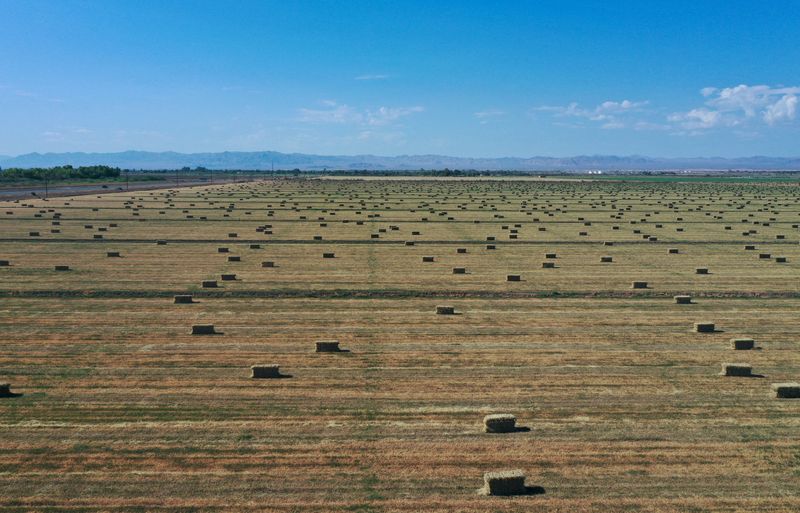
© Reuters. FILE PHOTO: An aerial view shows agricultural fields as California faces its worst drought since 1977, in Mundo, California, U.S., July 4, 2021. Picture taken with a drone REUTERS/Aude Guerrucci
By Leah Douglas
(Reuters) – Insurance payments to U.S. farmers for crops lost to droughts and flooding have risen more than threefold over the past 25 years, according to an analysis of federal data by the Environmental Working Group (EWG) released on Thursday.
The report reinforces concerns that insuring the nation’s crops will get more expensive for insurance companies, farmers and taxpayers as climate change drives more erratic weather events that disrupt agriculture.
The federal government pays about 60% of the nation’s crop insurance premiums through taxpayer subsidies, according to the Congressional Budget Office, and those premiums tend to rise as insurance payouts grow.
Insurance payments to farmers due to drought rose more than 400% between 1995 and 2020 to $1.65 billion, while payments due to excess moisture – like floods – rose nearly 300% to $2.61 billion, according to the nonprofit environmental group, which examined publicly available data from the U.S. Department of Agriculture.
Reuters reviewed the data, which showed a steady upward trend in insurance payouts over the period.
During the period analyzed by EWG, the number of insured acres grew just 84.5%, according to the data from the department’s Risk Management Agency, which administers the federal crop insurance program.
“As extreme weather has become more frequent, the climate crisis has already increased insurance payments and premium subsidies. These costs are expected to go up even more, as climate change causes even more unpredictable weather conditions,” EWG said in the report.
The report did not detail average increases in premiums since 1995. The cost of insuring crops, however, could increase between 3.5% and 22% by 2080 due to climate change, even if farmers adapted what and where they plant, according to a 2019 USDA report.
The most commonly insured crops include corn, soybeans, wheat and cotton.
The federal crop insurance program requires farmers to meet minimal conservation standards, like not planting on land highly vulnerable to erosion.
But Anne Weir Schechinger, the Midwest director of EWG, said those standards should be tougher. “The program needs to be reformed so it encourages farmers to be resilient to extreme weather events that we know are ahead,” she said.
Fusion Media or anyone involved with Fusion Media will not accept any liability for loss or damage as a result of reliance on the information including data, quotes, charts and buy/sell signals contained within this website. Please be fully informed regarding the risks and costs associated with trading the financial markets, it is one of the riskiest investment forms possible.
Stay connected with us on social media platform for instant update click here to join our Twitter, & Facebook
We are now on Telegram. Click here to join our channel (@TechiUpdate) and stay updated with the latest Technology headlines.
For all the latest Business News Click Here
For the latest news and updates, follow us on Google News.
